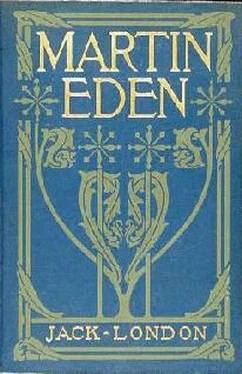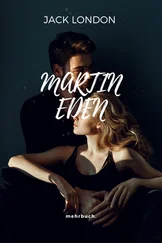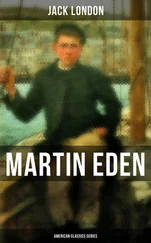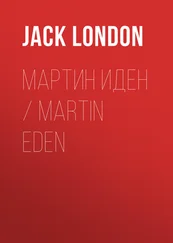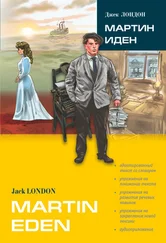Martin’s alienation from his family continued. Following upon Mr. Higginbotham’s unprovoked attack, Mr. Hermann von Schmidt showed his hand. The fortunate sale of several storiettes, some humorous verse, and a few jokes gave Martin a temporary splurge of prosperity. Not only did he partially pay up his bills, but he had sufficient balance left to redeem his black suit and wheel. The latter, by virtue of a twisted crank-hanger, required repairing, and, as a matter of friendliness with his future brother-in-law, he sent it to Von Schmidt’s shop.
The afternoon of the same day Martin was pleased by the wheel being delivered by a small boy. Von Schmidt was also inclined to be friendly, was Martin’s conclusion from this unusual favor. Repaired wheels usually had to be called for. But when he examined the wheel, he discovered no repairs had been made. A little later in the day he telephoned his sister’s betrothed, and learned that that person didn’t want anything to do with him in "any shape, manner, or form."
"Hermann von Schmidt," Martin answered cheerfully, "I’ve a good mind to come over and punch that Dutch nose of yours."
"You come to my shop," came the reply, "an’ I’ll send for the police. An’ I’ll put you through, too. Oh, I know you, but you can’t make no rough-house with me. I don’t want nothin’ to do with the likes of you. You’re a loafer, that’s what, an’ I ain’t asleep. You ain’t goin’ to do no spongin’ off me just because I’m marryin’ your sister. Why don’t you go to work an’ earn an honest livin’, eh? Answer me that."
Martin’s philosophy asserted itself, dissipating his anger, and he hung up the receiver with a long whistle of incredulous amusement. But after the amusement came the reaction, and he was oppressed by his loneliness. Nobody understood him, nobody seemed to have any use for him, except Brissenden, and Brissenden had disappeared, God alone knew where.
Twilight was falling as Martin left the fruit store and turned homeward, his marketing on his arm. At the corner an electric car had stopped, and at sight of a lean, familiar figure alighting, his heart leapt with joy. It was Brissenden, and in the fleeting glimpse, ere the car started up, Martin noted the overcoat pockets, one bulging with books, the other bulging with a quart bottle of whiskey.
Brissenden gave no explanation of his long absence, nor did Martin pry into it. He was content to see his friend’s cadaverous face opposite him through the steam rising from a tumbler of toddy.
"I, too, have not been idle," Brissenden proclaimed, after hearing Martin’s account of the work he had accomplished.
He pulled a manuscript from his inside coat pocket and passed it to Martin, who looked at the title and glanced up curiously.
"Yes, that’s it," Brissenden laughed. "Pretty good title, eh? ‘Ephemera’-it is the one word. And you’re responsible for it, what of your man , who is always the erected, the vitalized inorganic, the latest of the ephemera, the creature of temperature strutting his little space on the thermometer. It got into my head and I had to write it to get rid of it. Tell me what you think of it."
Martin’s face, flushed at first, paled as he read on. It was perfect art. Form triumphed over substance, if triumph it could be called where the last conceivable atom of substance had found expression in so perfect construction as to make Martin’s head swim with delight, to put passionate tears into his eyes, and to send chills creeping up and down his back. It was a long poem of six or seven hundred lines, and it was a fantastic, amazing, unearthly thing. It was terrific, impossible; and yet there it was, scrawled in black ink across the sheets of paper. It dealt with man and his soul-gropings in their ultimate terms, plumbing the abysses of space for the testimony of remotest suns and rainbow spectrums. It was a mad orgy of imagination, wassailing in the skull of a dying man who half sobbed under his breath and was quick with the wild flutter of fading heart-beats. The poem swung in majestic rhythm to the cool tumult of interstellar conflict, to the onset of starry hosts, to the impact of cold suns and the flaming up of nebular in the darkened void; and through it all, unceasing and faint, like a silver shuttle, ran the frail, piping voice of man, a querulous chirp amid the screaming of planets and the crash of systems.
"There is nothing like it in literature," Martin said, when at last he was able to speak. "It’s wonderful!-wonderful! It has gone to my head. I am drunken with it. That great, infinitesimal question-I can’t shake it out of my thoughts. That questing, eternal, ever recurring, thin little wailing voice of man is still ringing in my ears. It is like the dead-march of a gnat amid the trumpeting of elephants and the roaring of lions. It is insatiable with microscopic desire. I now I’m making a fool of myself, but the thing has obsessed me. You are-I don’t know what you are-you are wonderful, that’s all. But how do you do it? How do you do it?"
Martin paused from his rhapsody, only to break out afresh.
"I shall never write again. I am a dauber in clay. You have shown me the work of the real artificer-artisan. Genius! This is something more than genius. It transcends genius. It is truth gone mad. It is true, man, every line of it. I wonder if you realize that, you dogmatist. Science cannot give you the lie. It is the truth of the sneer, stamped out from the black iron of the Cosmos and interwoven with mighty rhythms of sound into a fabric of splendor and beauty. And now I won’t say another word. I am overwhelmed, crushed. Yes, I will, too. Let me market it for you."
Brissenden grinned. "There’s not a magazine in Christendom that would dare to publish it-you know that."
"I know nothing of the sort. I know there’s not a magazine in Christendom that wouldn’t jump at it. They don’t get things like that every day. That’s no mere poem of the year. It’s the poem of the century."
"I’d like to take you up on the proposition."
"Now don’t get cynical," Martin exhorted. "The magazine editors are not wholly fatuous. I know that. And I’ll close with you on the bet. I’ll wager anything you want that ‘Ephemera’ is accepted either on the first or second offering."
"There’s just one thing that prevents me from taking you." Brissenden waited a moment. "The thing is big-the biggest I’ve ever done. I know that. It’s my swan song. I am almighty proud of it. I worship it. It’s better than whiskey. It is what I dreamed of-the great and perfect thing-when I was a simple young man, with sweet illusions and clean ideals. And I’ve got it, now, in my last grasp, and I’ll not have it pawed over and soiled by a lot of swine. No, I won’t take the bet. It’s mine. I made it, and I’ve shared it with you."
"But think of the rest of the world," Martin protested. "The function of beauty is joy-making."
"It’s my beauty."
"Don’t be selfish."
"I’m not selfish." Brissenden grinned soberly in the way he had when pleased by the thing his thin lips were about to shape. "I’m as unselfish as a famished hog."
In vain Martin strove to shake him from his decision. Martin told him that his hatred of the magazines was rabid, fanatical, and that his conduct was a thousand times more despicable than that of the youth who burned the temple of Diana at Ephesus. Under the storm of denunciation Brissenden complacently sipped his toddy and affirmed that everything the other said was quite true, with the exception of the magazine editors. His hatred of them knew no bounds, and he excelled Martin in denunciation when he turned upon them.
"I wish you’d type it for me," he said. "You know how a thousand times better than any stenographer. And now I want to give you some advice." He drew a bulky manuscript from his outside coat pocket. "Here’s your ‘Shame of the Sun.’ I’ve read it not once, but twice and three times-the highest compliment I can pay you. After what you’ve said about ‘Ephemera’ I must be silent. But this I will say: when ‘The Shame of the Sun’ is published, it will make a hit. It will start a controversy that will be worth thousands to you just in advertising."
Читать дальше
